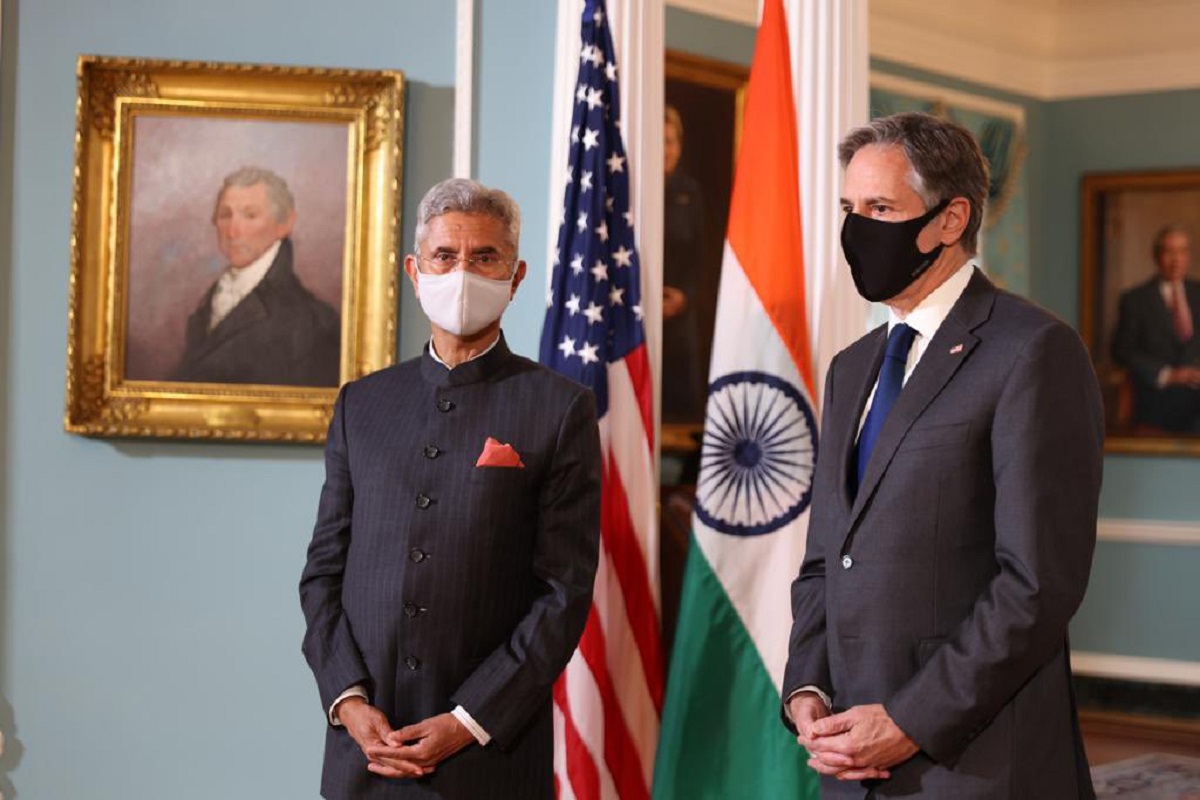John Abraham meets EAM Jaishankar before ‘The Diplomat’ hits screens
John Abraham meets EAM Jaishankar ahead of 'The Diplomat' release, calling it an emotional thriller that will keep audiences glued to their seats.
India, till recently considered a third world country, is a rising economic power where Western leaders rush to sign trade deals.

(Image: Twitter/@DrSJaishankar)
During his visit to the US last week, Foreign Minister S Jaishankar participated with General McMaster in a virtual discussion conducted by the Hoover institution. He was questioned on India’s handling of the pandemic. He stated, “We are giving free food to as many as 800 million people. We’ve put money into bank accounts of 400 million.” To underline his statement, he explained that India was providing food stocks to two and a half times the US population and funding more than its population. How many nations were able to sustain such expenditure through these trying times and receding economies?
On the global projection of a failing Indian government, Jaishankar added, “I would certainly see this very much as part of a political effort to depict our current government in a certain way and obviously I have a very profound difference with that.” In recent times, the global image of India has been of funeral pyres, depicting a nation failing in its battle against the pandemic. The world has witnessed multiple waves of the pandemic.
Advertisement
Casualties have been higher in percentages in countries possessing smaller populations, in numbers and/or density, than India, including US, European nations, Brazil etc. In no case were the deceased so disrespectfully depicted as in our case. The reality in the US was that Covid casualties were buried in mass graves employing mechanical means and without permitting the next of kin to pay their last respects or be present. Human touch to those who lost the battle against Covid was missing.
Advertisement
There were also reports of Covid casualties lying in refrigerated vans for a long time in New York, awaiting mass burials. Photographs in US and western media displayed people laying flowers in an open field in remembrance of the deceased. In Italy, the situation was so depressing that the army was called in to take over casualties and hurriedly cremate them away from cities. Most western nations, currently critical of India, adopted similar measures. Indians, on the other hand, cremated their dead with dignity and as per religious ethos, despite shortcomings and a spreading virus.
It was this display of religious reverence which the media displayed to depict a failing nation. Victory against Covid is not determined solely by the number of casualties (dead or infected), but by protecting the majority of the population, as also catering for their essential needs during periods of enforced lockdowns. Number of casualties are dependent on the population and density within a nation; while they matter, they cannot be ultimate determinants. Success should logically depend on reversing the Covid cycle with minimum inconvenience and suffering to the populace.
The fact that India being the world’s second most populated nation was bound to have higher casualties was ignored. There is no doubt the current government erred when it went ahead with elections, religious events and protests, adding to the spread. But why was India singled out globally? There could be multiple reasons, including internal political oneupmanship and anti-government groups grabbing an opportunity. India’s national power has risen in recent years. It is immune to global commentators, who felt they could compel third world countries to behave as per their whims and fancies.
India’s refusal to change decisions, whether on Kashmir or the Citizenship Amendment Act, despite criticism from so-called global watchdogs or senators or members of parliament of the Western world hurt privately funded influential organizations, many of whom control media houses. These were at the forefront in tarnishing the national image. Another plausible reason is jealousy of the Western world in witnessing an Asian nation becoming a global economic giant, overtaking most of their economies as also successfully countering the first wave.
India, till recently considered a third world country, is a rising economic power where Western leaders rush to sign trade deals. Grabbing a part of the growing Indian market is a pre-requisite for economic development for any Western country. This reversal in fortunes has hurt many influential organizations in the west. Western nations selfishly ignored third world countries and saved all vaccines and medical equipment which they could garner for their own populace, storing far more than necessary. It was India which reached out and supported weaker nations. Indian vaccine diplomacy earned it global praise, while the West was branded selfish.
Globally Indian generosity was praised, while it reflected adversely on the ethos and responsibility of the developed world. India was no longer a nation which could be ignored, and this irked so-called global watchdogs and influencers. Politics, within India, aided by some media personalities, also played a role in globally maligning the country. The opposition sought to target the current government but ended up tarnishing the national image. The pandemic was exploited as a political tool for influencing public opinion, as India remains perpetually in an election mode.
Claims of false reporting gained prominence. Governments are temporary and can change depending on the will of the people in future elections, while the nation is permanent. Those who exploited the pandemic to hit out at the government have harmed the national image, rather than an individual or a political party, due to their short-sightedness. In the long term, India will win the battle against the pandemic and will rise again. It will continue supporting the globe in the fight against the pandemic. However, what will take time is changing the adverse image of the nation.
(The writer is a retired Major-General of the Indian Army)
Advertisement